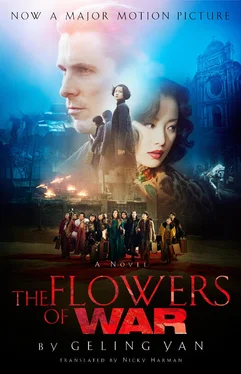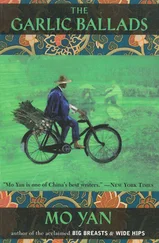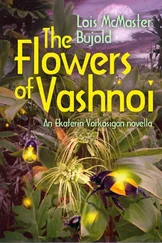‘If they leave here, then they’ll be shot again,’ said the major.
Suddenly Hongling chipped in. ‘Those murderous Japanese! … Officer, let them squeeze into our cellar!’
‘No!’ Father Engelmann roared.
‘Father, can we dress their wounds first and then assess the situation?’ Fabio said.
‘No,’ said Father Engelmann again. ‘This is getting out of hand. We’ve run out of water and food, and now three extra people … please consider our schoolgirls, the oldest only fourteen. What would you do in my position? I think you’d do what I’m doing and refuse to let soldiers in here. Soldiers will encourage the Japanese to come here. Is that fair to the girls?’ He enunciated the words with almost painful precision in an effort to make himself understood.
‘But won’t the Japanese come even if we’re not here?’ objected the sergeant major. ‘There’s nowhere they won’t go!’
Father Engelmann hesitated. The sergeant major had a point. From what he had seen it was clear that, to these crazed invaders, nowhere was taboo, nothing was sacred.
He turned to Dai. ‘Please understand my situation, Major, and take them away. May God protect you until you get to the Safety Zone, and God speed.’
‘Push the wheelbarrow over there,’ Dai said, pointing the gravedigger in the direction of the kitchen, as if he had not taken in a word of Father Engelmann’s Chinese. ‘Give them a little water and then let me take a look at their wounds.’
‘Stay right where you are,’ said Father Engelmann, blocking the way, his outstretched arms in the black cassock looking like two black wings.
Dai raised his gun again.
‘Are you going to shoot? If so, the church will be yours and you can put the wounded wherever you want. Go on, shoot,’ said the priest.
Dai pulled back the safety catch on the pistol.
Fabio’s jaw dropped open but he stood stock-still. He was afraid that any movement might set the bullets flying.
The wounded man in the wheelbarrow moaned in agony. It was the high-pitched moan of a boy of fourteen or fifteen with a just-broken voice, one who sounded close to death. None of this wrangling about neutrality seemed to matter, even life and death itself seemed trivial, when right there in front of them there was a boy soldier suffering such pain.
‘All right. Deal with the wounds and then we’ll see,’ Father Engelmann finally said.
‘The hot water’s ready!’ said George, who had been waiting quietly while the arguments went on around him. He had said nothing but he had taken sides, and had begun preparing to help the wounded. Now the very last of the remaining water from the cistern was heating on the stove.
The women had all emerged from the cellar by this time. They stood staring mutely at the dying boy soldier and the wounded sergeant in either distaste or fear, it was hard to tell. They could have been a phalanx of funeral mourners, or greeters at a party.
Major Dai was about to follow them when Father Engelmann stopped him.
‘Give me your gun, Major.’
The officer frowned. His expression said: What does this foreigner think he’s doing? The Japanese haven’t managed to disarm me yet!
‘If you want the church’s protection, then you must give up your weapon. The strength of this church lies in its neutrality, and we’ll lose that the minute we take in people who are armed. So give me your gun.’
Major Dai looked into the priest’s pale, foreigner’s eyes and said, ‘No.’
‘Then I’m not letting you stay.’
‘I won’t be staying, at least no more than a day or two.’
‘If you want to stay here for another minute, then it has to be as an ordinary citizen. If the Japanese discover you here with a weapon, I can’t defend you and I can’t defend the neutrality of the church either.’
‘If the Japanese really get in, and I haven’t got a weapon, then we’ll be like lambs to the slaughter.’
‘I can only give you refuge here as an ordinary citizen if you give up your weapon. Otherwise you must leave now.’
Major Dai hesitated, then he said: ‘I’ll just stay one night, long enough to debrief these two about the massacre of the prisoners of war. Then I’ll go.’
‘I told you. Not another minute.’
‘Do as the Father says, Major,’ put in Fabio. ‘You’re seriously wounded yourself. If you leave here, you’ll be without food and water, and the Japanese are everywhere. How far will you get? At least get your wound treated and give yourself a bit of a rest and then go.’ His Yangzhou accent had a persuasive force to it. He sounded as if he was trying to make two squabbling village boys see the error of their ways.
Slowly, Major Dai clicked on the pistol’s safety catch. Then he turned the muzzle towards himself and gave the pistol, butt-end first, to Father Engelmann.
Eight


To maintain propriety, the cellar was divided in two with the aid of an old curtain from the library. The three men had one side, the women the other. As Fabio came down the ladder to inspect the arrangements, his nostrils were assaulted by an extraordinary medley of smells: foodstuffs stored for long years, pickles, cheese, wine … their substance may have disappeared but their essence remained. It was as if the smells had continued to ripen until they filled the air with a pungent, almost tangible odour. Fabio felt faint as he got to the bottom of the ladder. New smells had been added to the mixture since this had become a makeshift living space: the body odour of fourteen women and three men, the contents of two toilet buckets, as well as perfume, face cream, hair oil, talcum powder and tobacco …
The sergeant major’s name was Li Quanyou and the boy soldier was Wang Pusheng. Fabio learned that the boy had only been conscripted a month before, having been dragged from the sweet-potato patch in front of his house and handed a uniform. The day he put it on, he was given a rifle and a munitions belt and taken off to the village threshing circle to learn how to use his bayonet and take aim, before being sent to Nanking. He had not even had one chance to shoot his gun because his superior said bullets were worth their weight in gold and had to be kept until they got to the battlefield. Once there, he had fired only a few shots when he was wounded.
Sergeant Major Li’s left leg was badly injured. He had been stabbed four times and the tendons behind the knee had been severed so that the limb looked dead as he dragged it uselessly behind him.
It took some probing for Major Dai to extract the story of what had happened to them. At first when he asked, Li just said: ‘Don’t want to talk about it. They’re motherfuckers, I’ve never been in such a hellish situation!’ Or: ‘I just don’t remember!’ It was only after he’d had some wine that he started to tell the story. The wine, of course, belonged to the church and had been smuggled to the soldiers by the women. By that time, adversity had drawn the soldiers and the prostitutes into a close alliance.
Major Dai told the story to Fabio, who relayed it to Father Engelmann.
The day after Li Quanyou and Wang Pusheng’s unit had sworn that they would defend the city to the last man, they had lost contact with their GHQ. As a result, their officers had no idea where to go or how to fight. They also did not know which direction the enemy was attacking from. It was only when the Japanese breached their lines and marched into Nanking that Li and his men realised they were defeated pawns in a chess game.
Читать дальше














